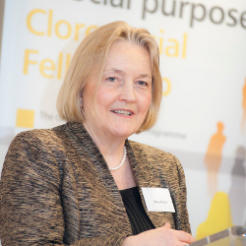Dame Mary Marsh, founder of the Clore Social Leadership programme and former chief executive of the NSPCC, has said she is concerned that some graduates working in larger charities are underemployed and not used to their full potential.
Dame Mary was speaking at an event to announce the national rollout of the CharityWorks programme, an initiative which fast-tracks bright university-leavers into management careers in the charity sector.
Dame Mary and three panellists were asked to predict what the charity sector workforce would look like in 2020.
Dame Mary said an issue with the voluntary sector workforce today was that many graduates were “hugely underemployed” and not being stretched or used to their full potential.
Fluid workforce
Looking forward, Dame Mary said the social sector needed to be more open and fluid about its workforce in the future. “The social sector is growing rapidly. There are CICs, CIOs, social businesses; it’s not just large charities and regional patterns are very different. The public sector is also outsourcing.
“We will have to be more open to working in different forms.”
Dame Mary also said that in the future nobody would have a career as it is now traditionally understood, and the need to be digitally fluent was essential, adding that at the moment the sector did not use data effectively enough.
She added: “Organisations should appoint for mindset, value and potential, not just skills. And collaboration and partnerships are essential.”
Dame Mary led the goverment's leadership and skills review for the charity sector this year, and in her report she called for a TeachFirst equivalent for the voluntary sector.
Replicating scheme in 100 places
CharityWorks celebrated its fourth birthday last night as it announced that it would create 100 regional CharityWorks programmes in order to meet the massive demand for its service. This year, more than 3,000 applications were received for just 35 places.
Programme director Rachel Whale hailed the high retention rate of the programme, and the almost 100 per cent employment rate for graduates.
“We have had growth rate of 29 per cent, and this year organisations came forward to us to take part. A third of placements are outside London, so we are starting to regionalise.”
She added that the 3,000 people had applied to the scheme from over 200 universities and 28 countries, when the organisation had no marketing budget. “We operate through relationships,” she said.
Minister for civil society Nick Hurd who opened the event said it was a fantastic scheme. “How to attract the brightest and best to our sector is one of our biggest challenges,” he said.









